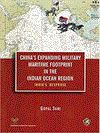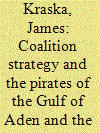| Srl | Item |
| 1 |
ID:
144488


|
|
|
|
|
| Summary/Abstract |
Oceans link India across the continents in its benign quest for peace and tranquility. Compared to the vastness of the oceanic imponderables, the understanding of the oceanic environment appears to be in its infancy. There is a need to enhance information about the oceanic sciences across large distances and great depths, as this would enhance national security. This is well beyond the resource capacity of any one nation in the Indian Ocean Region. As a first step, the area of cooperation can include the setting up of sea observatories. This would require collaboration in sensor technologies for ocean environment, computation and processing ability, management of information, and enhanced communication systems over and under the seas. Such partnerships would create enhanced oceanic information zones, which would help strengthen the national security of a nation as well as regional maritime security.
|
|
|
|
|
|
|
|
|
|
|
|
|
|
|
|
| 2 |
ID:
154802


|
|
|
|
|
| Publication |
New Delhi, Pentagon Press, 2017.
|
| Description |
119p.pbk
|
| Standard Number |
9789386618122
|
|
|
|
|
|
|
|
|
|
|
|
Copies: C:1/I:0,R:0,Q:0
Circulation
| Accession# | Call# | Current Location | Status | Policy | Location |
| 059164 | 359.030951/SUR 059164 | Main | On Shelf | General | |
|
|
|
|
| 3 |
ID:
104086


|
|
|
|
|
| Publication |
2009.
|
| Summary/Abstract |
The April 2009 seizure of the U.S.-flagged Motor Vessel Maersk Alabama and its twenty American crew members off the coast of Somalia should signal a change in counterpiracy strategy, away from a focus on major warship deployments by distant state major maritime powers, and toward development of a regional maritime security force constructed around numerous smaller patrol craft. Outside powers should focus on further advancing new international law and policy frameworks, which have become the most significant force multipliers for developing maritime security and offer the most effective approach to counterpiracy in the Horn of Africa. Complementing this effort will require a long-term program of regional maritime-security capacity building to support implementation of the new law and policy approaches. Piracy flourishes at the seams of globalization because jurisdiction is unclear and pirates exploit the inherent isolation of individual vessels and nations. Regional powers in the Horn of Africa have underdeveloped law enforcement and judicial systems and suffer from a severe lack of resources. In this setting, global and regional legal and policy frameworks in the areas of operational maritime security, judicial institutions, and law enforcement will be more effective in addressing piracy than adding another warship from an outside naval power to the equation.
|
|
|
|
|
|
|
|
|
|
|
|
|
|
|
|
| 4 |
ID:
157802


|
|
|
|
|
| Summary/Abstract |
There is a new conception of India's security taking shape in the Asian maritime domain. India's new evocation of security creates a seamless expanse of its interests from continental homeland transcending the coastal areas and extending to the maritime expanse of the Indian Ocean Region (IOR). This new approach of India seeks to secure its interests through an effective mix of soft and hard power built on a conception of security outreach that extends to the high seas. As the largest regional navy in South Asia with ever enlarging pan-Asian interests, India's attempt to find the right balance between adopting protective and assertive policies in the Asian maritime domain is gradually emerging as its fundamental strategic dilemma. India's approach to coastal security, territorial waters and even the exclusive economic zone signals a recalibration that repositions security, trade, connectivity and most of all counter-strategies to regain influence in the region.
|
|
|
|
|
|
|
|
|
|
|
|
|
|
|
|
| 5 |
ID:
168417


|
|
|
|
|
| Summary/Abstract |
Recent developments in the eastern Mediterranean, such as significant gas finds; disagreements over the demarcation of maritime boundaries; large-scale violence and political instability following the Arab Spring; mass migration via sea routes; Great Power dynamics in the region; and environmental hazards, make the political entities along the shores of the eastern Mediterranean part of a regional security complex and create strong incentives for regional coordination on maritime security. Material international relations theories predict that growing security challenges (realism) coupled with expected gains (liberalism) will facilitate regional cooperation. Yet, the political entities in the region rely mainly on unilateral actions, or limited quasi-alliances in response to these challenges. The article shows the puzzling gap between the theoretical expectation and practical outcome in the region and explains why regional cooperation in the maritime domain fails to occur. It argues that cooperation on a regional scale fails to take place due to three complementing reasons: 1) lack of shared ideational features like cultural traits, set of values and regime type; 2) enduring rivalries between political entities in the region (Israel–Palestine; Turkey–Greece–Cyprus) coupled with internal strife within other regional political entities (Libya; Syria); and unequal political standing and lack of sovereignty of some of the political entities in the region (Northern Cyprus; the Palestinian Authority and the Gaza Strip).
|
|
|
|
|
|
|
|
|
|
|
|
|
|
|
|